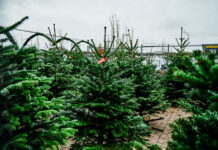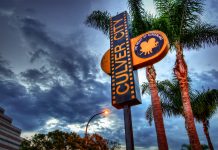We often are urged to take time to smell the flowers. But what about taking time to learn how to grow them, as well as produce and herbs? That’s where The Learning Garden at Venice High School comes in, an environment within which plants as well as their gardeners are enabled to flourish.
The origin of this model example of the transformative effect a school garden can have on students, teachers and the community is traceable to a minor task that was assigned to Julie Mann who, as a mother of two students then enrolled at Venice High, frequently volunteered at the school.
She had been given some tiles and told to “just dump them in the garden area of the school.” This was the first time she’d been inside the garden area “and I was stunned at the potential of this space to be used as a garden. As a homeopath, I had been studying with David Crow and we had been interested in learning how to grow medicinal herbs and learning to have a relationship with them. I went back to David and said, ‘I think I’ve found a great place to grow herbs!’ David immediately began to work on a coalition to put a proposal to the school. The principal at the time, Jan Davis, was very responsive to the concept and we were able to break ground with a couple of grants within a year. We’ll be ten years old in May 2012!”
The Garden’s influence is far-reaching, as the UCLA Horticulture Department teaches its extension program there, Yo San University of Traditional Chinese Medicine holds regular classes and events there, and the Agape Spiritual Center is actively involved in regular work days and special projects there. It is also “home base” for Our Time Bank, a local moneyless economy model; Westside Produce Exchange, a local sharing of extra harvest with neighbors that helps everyone even out their harvests; and the Seed Library of Los Angeles (SLOLA.org), housing open pollinated seeds and teaching why and how to save seeds.
Diane Pollock, who teaches the Horticulture Program at Venice High, found it “amazing how students’ perceptions about food and how they feed themselves, and therefore how they treat themselves, slowly changes. We are exposing these students to a different type of life and a different way of doing things and they get it! Last fall, as we began the school year, I asked a student to help me harvest onions from the Garden to get it ready for planting. After he had pulled a few onions from the ground, he looked at me and said, ‘Wait. Are you telling me this is where onions come from?’ He really had no idea that onions were grown in the ground versus just appearing on grocery shelves.”
Pollock added, “The students are exposed to science and scientific inquiry, even though we don’t call it that. Students are also exposed to being a beneficial part of the community because excess produce is sent to a local food bank. When we have lots of produce being donated all the time, they begin to get excited about the pounds of produce as it grows week after week. They feel good that their efforts make a difference in the greater community, especially now when the economy is so difficult and they hear their parents at home talking about making ends meet. They can make the connection.”
“The carrots we eat here, we grow here,” said former student Vivian Mitnik. “I learned they are better about four inches long, but in the grocery store they are about a foot long and those aren’t really that tasty compared to the ones we have here. The little carrots you see at the store don’t taste that good either. That’s why you have to dip them in something. I didn’t care about food before, but I’ve learned that vegetables can be good if they are made right and fresh.”
The Garden’s goals are ambitious.
“This year we’re planning to donate more than 500 pounds of fresh food to a local food bank,” said Garden Master David King, pausing to reminisce about an early experience.
“When we first began to take food out of the garden to be used by the community,” he said, “we took it to shelters directly. The first shelter I took it to was for homeless elderly. I arrived with a truckload of chard, beets, onions, kale, broccoli and some rhubarb. I put all my veggies onto a table with one woman watching me. English was not her first language and I had a hard time telling her this food was for her to take. Finally, she went to the table and snatched up a handful of the rhubarb. ‘This is rhubarb,’ she said fiercely in her heavy accent. ‘It is very important in my country.’ She paused for a long time, looking at the rhubarb and in a softer voice she said the words that showed me she knew her rhubarb: ‘Takes lots of sugar!’ It was so meaningful for me because she was so intense about it.”
Continuing with the list of goals, King explained “we also want to involve at least 25 Venice High School students in our Seed to Sale Program, where they grow plants that are then sold at our local farmers’ market. We intend to further community involvement in the Garden by hosting many different community programs. We will participate in community garden tours and have high school students act as docents to teach adults about gardening and sustainability, and we intend to teach students from pre-school to post-grad about gardening and growing food, as well as participating in awareness events of all kinds.”
In addition to the informal potlucks on Fridays at 12:30 p.m., King enumerated several events that are planned for this year.
“On the first Saturday of every month we have What to Do and When to Do It; Growing Food in Southern California,” he said. “We also want to increase the presence of art in the garden, so we have started a monthly showcase on the second Sunday for poets, singer/songwriters, and artists of all kinds. In February we featured three local poets reading their work. In March we’ll have three singer/songwriters performing from their catalog. In April there’s a tea to bring out fans of good food. In June we’ll have a Summer Solstice observance. On July fourth we’ll have our sixth Ice Cream Social and all the flavors, except vanilla, come from the Garden. In September we’ll have our eighth annual Pesto Day. We make pesto from a special variety of basil harvested fresh from the garden and sell jars of the stuff to eager repeat customers. On Thanksgiving, the Garden and our volunteers host the clients and staff of Program for Torture Victims for a traditional Thanksgiving feast on our patio. And by December, we settle into our Winter Solstice celebration.”
As Gandhi said, “To forget how to dig the earth and to tend the soil is to forget ourselves,” so visit thelearninggarden.org or call King at (310) 722-3656 to find out how to get involved in this living classroom and sanctuary, and keep the garden growing.












